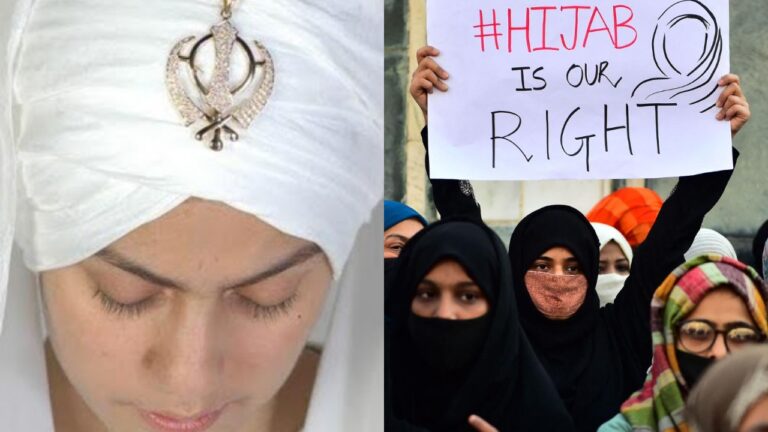
While the row over allowing hijab in educational institutions in Karnataka continues, a 17-year-old Amritdhari Sikh girl was asked by her college to remove her turban in accordance with its dress code and the interim order of the Karnataka High Court.
The court earlier had restrained students from “wearing saffron shawls, hijab and religious flags or the like in classrooms of colleges which have prescribed a uniform”.
The student of Mount Carmel PU College, Bengaluru, who is also the president of the students’ association, was politely asked to remove her turban for the first time on February 16 to which she refused. The college later spoke to her father stating they understood the importance of the turban for a Sikh but were bound by the High Court order.
In an email, the college authorities stated, “We believe in an inclusive society and respect all religious practices . According to the vision and mission of the college , we follow inter – religious harmony . For your information , we also have an active inter religious association . We were delighted to hear that you are an active member of the inter religious group at Ashirwad. We understand that the turban is an integral part of Sikh men / women and we do respect your belief. As a PU College with an uniform dress code , we have to abide by the High Court Order. We want to bring this to your notice and request you to kindly cooperate in order to maintain peace and harmony.”
The student’s father Gurcharan Singh responded, “Thanks for your mail, as mentioned in my earlier mail, I have gone through this order and this High court order does not mention anything about Sikh Turban, it should not be misunderstood. However I am also in touch with our community advocates and various organisations. I am sure none of us wants to spend time on such matters and we should focus on education and personality development which is the core objective of the institution. I hope you would consider this case and oblige by allowing her with her turban to attend the classes.”
Singh has also written a letter to Jeetendra Singh, administrator of Sri Guru Singh Sabha, Ulsoor, Bengaluru, about the issue.
In the email he said, “Asking a Sikh to remove his/her turban is a big insult to a Sikh and the entire Sikh community. We also stand by those Muslim girls/women who want to cover their head with scarf/dupatta as a part of their faith and request authorities to allow them to do so as it was already practised in our country and it does not cause any trouble to other people. The colour of the scarf and dastaar (turban) can match the uniform of the institution.”
The incident comes after the Karnataka High Court heard the petition filed by six students against not being allowed to wear hijab within college premises. Soon after that, students started protesting against and in favour of the decision.
READ MORE: Hijab row: Karnataka govt’s ban on clothes disturbing social harmony
On February 10, the court passed an interim order that restricted students from wearing anything else other than the prescribed school uniform.
Karnataka’s capital is the cosmopolitan hub Bengaluru, a city of about 12 million people that is the centre of India’s booming IT industry.
The school ban on the hijab – the traditional covering of the hair and neck worn by Muslim women – fanned protests by some Muslim students and parents around Karnataka earlier in the month. There were some counter protests by Hindu students draped in saffron-coloured shawls, usually worn by Hindus.
There was no violence but such tensions are a hot-button issue in India, where Muslims account for about 13% of the country’s 1.35 billion people. India has experienced several deadly Hindu-Muslim riots since independence in 1947, but hardly any of them in the south.
Muslims say the hijab row is another example of their marginalisation since Modi first took office in 2014 on a platform of good governance and a strong Hindu identity.
Modi has defended his record and says his economic and social policies benefit all Indians.
Analysts and opposition leaders say the vitiated political environment in Karnataka could dent Bengaluru’s appeal as a favoured destination for migrants and expatriates.